南昌大学管理类学术英语平时成绩构成及期末考试题型
学位英语题型及考试形式

学位英语题型及考试形式
学位英语考试是一种针对成人高等教育学位英语水平的考试,其题型和考试形式与普通英语考试有所不同。
首先,学位英语考试的题型主要包括阅读理解、翻译、写作、听力等。
其中,阅读理解部分主要考察考生对文章的理解和推理能力,需要考生能够理解文章的主旨、细节和推理出正确的答案。
翻译部分主要考察考生的语言转换能力,需要考生能够将英文句子翻译成中文或中文句子翻译成英文,并保持意思的准确性和流畅性。
写作部分主要考察考生的语言表达能力,需要考生能够根据给定的话题或主题,写出结构清晰、语言流畅、内容充实的文章。
听力部分主要考察考生的听力理解能力,需要考生能够听懂录音材料中的对话或短文,并从中提取关键信息,回答相关问题。
其次,学位英语考试的考试形式为机考,考生需要在计算机上完成考试。
考试时间一般为120分钟,总分为100分。
考试内容涵盖了成人高等教育各个专业的基础英语知识,包括词汇、语法、阅读、翻译、写作等方面。
总之,学位英语考试是一种针对成人高等教育学位英语水平的考试,其题型和考试形式与普通英语考试有所不同。
考生需要掌握一定的英语基础知识和技能,并熟悉考试形式和题型,才能取得好的成绩。
学术英语考试题型+出题范围+平时成绩构成2018-2019(下)
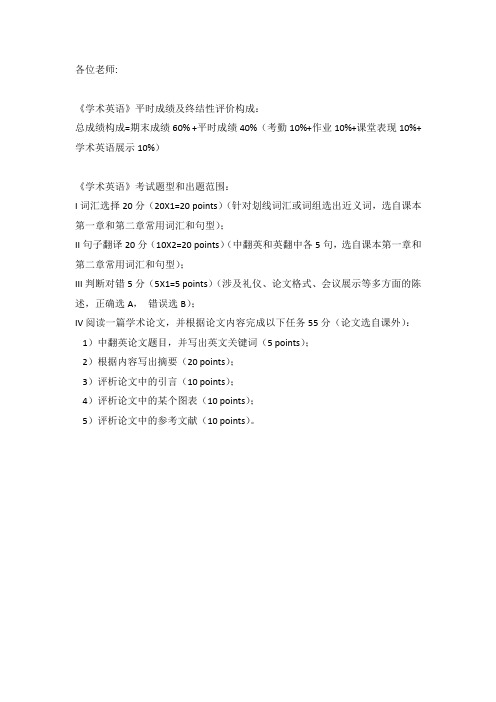
各位老师:
《学术英语》平时成绩及终结性评价构成:
总成绩构成=期末成绩60%+平时成绩40%(考勤10%+作业10%+课堂表现10%+学术英语展示10%)
《学术英语》考试题型和出题范围:
I词汇选择20分(20X1=20points)(针对划线词汇或词组选出近义词,选自课本第一章和第二章常用词汇和句型);
II句子翻译20分(10X2=20points)(中翻英和英翻中各5句,选自课本第一章和第二章常用词汇和句型);
III判断对错5分(5X1=5points)(涉及礼仪、论文格式、会议展示等多方面的陈述,正确选A,错误选B);
IV阅读一篇学术论文,并根据论文内容完成以下任务55分(论文选自课外):1)中翻英论文题目,并写出英文关键词(5points);
2)根据内容写出摘要(20points);
3)评析论文中的引言(10points);
4)评析论文中的某个图表(10points);
5)评析论文中的参考文献(10points)。
南昌大学学术英语期末试卷2019
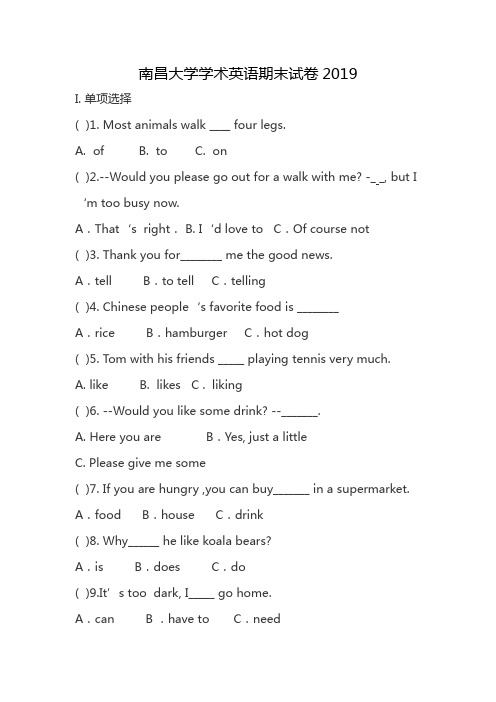
南昌大学学术英语期末试卷2019I. 单项选择( )1. Most animals walk ____ four legs.A. ofB. toC. on‘m too busy now.A.That‘s right. B. I‘d love to C.Of course not( )3. Thank you for________ me the good news.A.tell B.to tell C.telling( )4. Chinese people‘s favorite food is ________A.rice B.hamburger C.hot dog( )5. Tom with his friends _____ playing tennis very much. A. like B. likes C . liking( )6. --Would you like some drink? --_______.A. Here you are B.Yes, just a littleC. Please give me some( )7. If you are hungry ,you can buy_______ in a supermarket. A.food B.house C.drink( )8. Why______ he like koala bears?A.is B.does C.do( )9.It’s too dark, I_____ go home.A.can B .have to C.need( )10. --________does your uncle do? - He is a teacher. A.What B.Where C.How( )11. What do you usually do____ Sunday mornings.A. inB. atC. on( )12.---Don’t run in the hallways.---______,I won’t do it again.A.Sorry B. Excuse C. No( )13.The teacher tells us not ______a hat in class.A. wearB. wearingC. to wear( )14.His mother ___ in a hospital, but she ____ these days.A. works, isn’t workingB. is working, worksC. is work, doesn’t work( )15.Listen! Who ____ behind the tree?A sings B. is singing C. singing( )16.Shanghai is bigger than (比……大)_____ city in China.A. anyB. otherC. any other( )17.Elephants are very friendly and they like______ grass.A. eatB. to eatingC. to eat( )18.---Let’s go to see the action movies.---________________.A.Yes, we do.B. No, we don’t.C. That sounds exciting. ( )19.Jim, _____ look outside. Look at the map.A. doesn’tB. don’tC. isn’t( )20 Jim often gets____ school at eight and gets ___ home at fiveA. \; \B. to; \C. \; toII. 完形填空( ) 1. A. is B. am C. are D. be( ) 2. A. with B. on C. by D. in( ) 3. A. on B. by C. in D. at( ) 4. A .by B. on C. at D. in( ) 5. A. in B. at C. on D. by( ) 6. A. their B. one C. hers D. his( ) 7. A. class B. teacher C. school D. home ( ) 8. A. watch B. do C. make D. read ( ) 9.A.see B. look C. read D. watch ( ) 10.A.school B. bed C. work D. classIII.情景交际从II栏中选出与I栏相匹配的答语I 栏 II 栏( ) 1. What time do you want to go ? A. No, she is using a computer.( ) 2. What’s he doing? B. Sure. The TV show is boring.( ) 3. Let’s go shopping. C. At about two o’clock. ( ) 4. Do you want to see a film ? D. He is listening to a CD.( ) 5. Is Lily singing ? E. All rightIV. 词汇A.根据句意及首字母提示,完成下列单词1. Bob is from America but now he l____ in Australia.2. We must keep q____ in the library.3. He usually r____ his black bike to school from Monday to Fri day.4. We are n ___ here. We need to find a guide(向导) to help us.5. Some c______ are having lunch.B.用括号内所给单词的适当形式填空1. Her brother _______ (not read) a book now.2.______ (eat) more fruits and vegetables is good for your hea lth.3. Here ______ (be) some drink for you .4 .You‘d better_______ (get)to school early.5. What about ________(leave)for Shanghai for weekends? V. 句型转换________ your mother __________?2. Why not go to play football?( 改为同义句)______ ______ to play football._______ do you ______ koalas?4. They often play with the cute dog. (用now改写)They ________ ________ with the cute dog now.5. Remember to post the letter for me.(改为同义句)______ _______ to post the letter for me.VI. 阅读理解AMr Jones and Mr Brown work in the same office .One day Mr Jones says to Mr Brown .“I will have a small party at our house on Monday eveni ng . Would you and your wife like to come ?” Mr Brown says , “Thank you very much . I’d love to , but let me ask my wif e first . ” So Mr Brown goes to the other room and telephones his wife . Then he comes back and looks very worried . “W hat’s the matter?” asks Mr Jones . “Is your wife there at ho me ?”“No,” answers Mr Brown . “She isn’t there . My small son answers the telephone . I say to him ,’Is your mother there , David ?’ and he answers ‘No , she isn’t in the house .’‘Where is she ?’ I ask , ‘She is somewhere outside’.‘What’s she doing ?’‘She is looking for me .’”阅读短文,判断正(“T”),误(“F”)。
2023年南昌大学学位英语考试真题
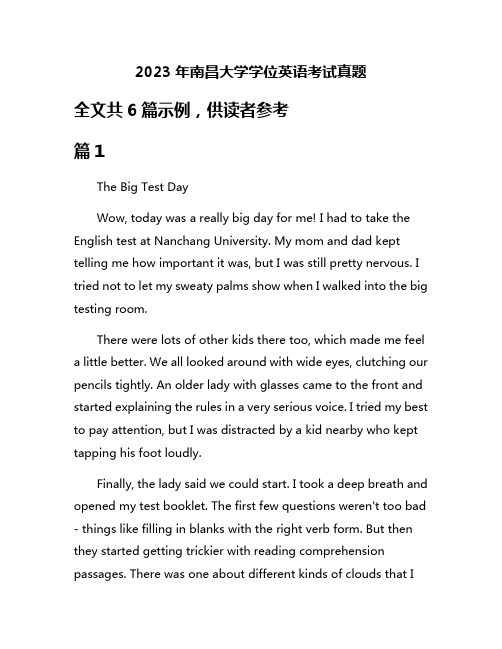
2023年南昌大学学位英语考试真题全文共6篇示例,供读者参考篇1The Big Test DayWow, today was a really big day for me! I had to take the English test at Nanchang University. My mom and dad kept telling me how important it was, but I was still pretty nervous. I tried not to let my sweaty palms show when I walked into the big testing room.There were lots of other kids there too, which made me feel a little better. We all looked around with wide eyes, clutching our pencils tightly. An older lady with glasses came to the front and started explaining the rules in a very serious voice. I tried my best to pay attention, but I was distracted by a kid nearby who kept tapping his foot loudly.Finally, the lady said we could start. I took a deep breath and opened my test booklet. The first few questions weren't too bad - things like filling in blanks with the right verb form. But then they started getting trickier with reading comprehension passages. There was one about different kinds of clouds that Ithought was pretty interesting. I learned that cumulonimbus clouds are the tall, dark ones that bring thunderstorms!The writing section made me nervous though. We had to write a short essay about our favorite subject in school. I really like art class, so I wrote about that. I made sure to describe everything clearly and use a lot of descriptive words, just like my teacher says. I really hope I didn't make too many spelling mistakes!After what felt like forever, the lady finally called time. I could barely keep my eyes open by then. My hand was cramping up from writing so much. As I walked out, I saw my parents waiting with big smiles on their faces. I felt proud for working so hard, whatever my score ends up being.On the car ride home, we stopped for ice cream to celebrate me being done. I got a huge banana split, my favorite! It was well-deserved after sweating through that tough test. Mom and dad said they were proud of me no matter what. I'm just glad it's over!While I don't know my score yet, I gave it my best effort. More than anything, I'm relieved I don't have to stress about studying for it anymore. I can go back to just being a regular kid - playing outside, reading fun books, and raising my hand inclass even when I'm not totally sure of the answer. No more practice test booklets for me, at least for a little while!I know the English test is really important for getting into a good university later on. But I'm also just glad I got through this first big exam experience. It was a little taste of what life will be like as I get older and have to take even bigger tests. As long as I stay focused and give it my all, I think I'll be just fine. Today's test may have been tough, but I made it through!So while my hand is still a little sore from all that writing, I've got to hand it to Nanchang University. They really made us work hard on that test! I'm feeling accomplished, relieved, and ready for a nice summer break. Maybe I'll spend some time reading English books, just for fun this time. But first, I've got a banana split calling my name!篇2My Big Test DayHi! My name is Lily and I'm in 5th grade. Today I had to take a really big test called the English Proficiency Test. It was at Nanchang University which is a huge school with lots of big buildings and older students everywhere. I was pretty nervous!My mom drove me to the university early in the morning. The test was going to last a long time, like 4 hours! That's forever for a kid. We found the building where I was supposed to take the test. There were lots of other kids my age there too, looking just as nervous as me.After waiting in some long lines, a nice university student led my group to a big classroom. There were desks everywhere and it looked just like the classrooms the篇3My Big English Test Adventure!Wow, what an exciting day I had! I took a really important English test at Nanchang University. My mom and dad were so proud that I got to take this big test for smart kids. I was a little nervous at first, but then I remembered how much I love English class with Mrs. Garcia. She's my favorite teacher and always makes learning English super fun!The test was at this huge university with massive buildings everywhere. I felt like a tiny little kid walking around the gigantic campus. Good thing my dad was there to help me find the right place. We had to get there really early before the test started.There were tons of other kids there too, all looking pretty nervous and clutching their pencils tightly.Finally, it was time to go into the test room. The nice ladies at the front led us all into a ginormous hall with millions of desks. Okay, maybe not millions, but there were a whole lot of desks! I found my assigned seat and pulled out my pencils and eraser, ready to rock this test. My heart was beating like a drum in my chest.The first part was listening, which is my favorite! I'm basically a pro at that section from watching so many English movies and shows with my brother. We had to listen really carefully to recordings and answer multiple choice questions about what we heard. Easy peasy! Those poor voice actors though, they must have gotten so tired of saying the same things over and over again to record everything.Next up was reading, which isn't quite as fun as listening but I can handle it. We read some passages about topics like science and history, then had to answer questions proving we understood what we read. There were a couple Fiction stories too, which were much more interesting than the non-fiction stuff. My teacher always says reading is the key to building my English skills, so I tried my best.After that was the writing section, which is definitely the hardest part for me. We had to write a short essay responding to a prompt about our favorite memories. I did my best to use all the good vocabulary and grammar I've learned, like complex sentences and descriptive adjectives. Hopefully my essay about the time I went camping with my family didn't have too many silly mistakes!The final section was speaking, where we had to answer some questions out loud while being recorded. I raised my hand and asked the nice proctor lady if we could get a lollipop after, but she just laughed at my joke. I tried to speak extra clearly and confidently when describing my favorite book characters. Talking in English still feels a little weird, but practicing is the only way to get better.Phew, finally the test was over after what felt like a million hours! My hand was getting so tired from bubbling in all those answer sheets. All the kids basically sprinted out of the hall, excited to have some free time again. A bunch of my friends and I went to the university cafeteria to celebrate being done with the test. Their chicken nuggets were delicious!Overall, it was a pretty awesome experience getting to take a big important test at a university. I felt so grown up andaccomplished, like one of those scholarly kids you see in the movies. A huge thank you to my teachers and parents for helping me prepare and do my best. Who knows, maybe I'll be attending Nanchang University as a student myself someday!I'll just need to wait anxiously for my results to see if I get a high enough score. No matter what though, I'm really proud of myself for trying my hardest. Now it's time to relax, no more studying for a while!篇4The Big Important English TestHi there! My name is Lily and I'm a 10-year-old 5th grader. I just took a really big and important English test called the Nanchang University English Test for Academic Purposes. It was super long and hard, but I'll do my best to tell you all about it!First off, the test was at my big brother's university, Nanchang University. It's a huge place with lots of big buildings and students walking around looking very serious and smart. I was pretty nervous when we first got there because everything seemed so grown-up and official.The test was held in this massive auditorium with what felt like a million desks all lined up in perfect rows. When I walked in,I couldn't believe how many other kids were there too! There had to be at least a few hundred students, maybe even more. I quickly found my assigned seat number and plopped down, taking some deeeep breaths to stay calm.As soon as the professors handed out the test booklets, I could tell this was no ordinary English quiz. The booklet was super thick, WITH TABS AND EVERYTHING! It had sections for listening, reading, writing, and something called "use of English" which sounded pretty confusing.The listening part was first. We all had to put on headphones and listen really carefully to recordings of people talking about all kinds of subjects - science, history, daily life situations. There were multiple choice questions where we had to pick the correct answer based on what we heard. That part wasn't too bad for me since my English listening skills are pretty good from watching so many cartoons and movies.Next up was the reading section and let me tell you, those passages were NO JOKE! The texts were sooooooo long and full of difficult vocabulary words I'd never heard before. There were passages about global trade, the environment, modern technology - definitely not your typical reading material for a 5th grader. I had to read each one very slowly and carefully whileanswering comprehension questions along the way. My brain was spinning by the end!After reading came the "use of English" section, which focused a lot on grammar. We had to identify errors in sentences, re-write incorrect phrases using proper English, and choose the right words to fill in blanks. As someone who still struggles with grammar rules like past participles and conditionals, this part was pretty tricky. I just had to apply what I've learned in English class and make my best educated guesses.Finally, the writing section - which was definitely the hardest for me. We had to write a lengthy essay arguing for or against a controversial opinion statement. The topic I got was "Competitive video gaming should be considered a real sport." As an avid gamer myself, I had some strong opinions on that one! But it was hard to organize my thoughts and provide clear evidence and examples to persuade the reader. Writing has always been one of my biggest challenges when it comes to English. I wrote and rewrote and revised my essay over and over until I thought it sounded decent. Hopefully I managed to get my point across!Phew, I'm exhausted just recounting all that to you! The whole testing experience took almost 4 hours from start to finish.By the time it was over, my hand was cramping, my brain felt fried, and I was SO ready for a break. Those poor university students must take exams like that ALL THE TIME - I don't know how they do it!While it was definitely challenging, I'm really glad I got the opportunity to take the Nanchang University English Test for Academic Purposes. It made me realize how much I've learned so far through hard work and diligent English study. But it also showed me that there's still SO MUCH more for me to work on and improve when it comes to English proficiency.Tests like these aren't just markers of our current abilities. They're a preview of the kind of high-level English skills we'll need to be successful in higher education and our future careers. By taking this test as a 5th grader, I got a taste of what lies ahead and what an important role English will play in achieving my dreams down the road - whether that's becoming a video game designer, scientist, author or whatever I decide!I'm proud that I pushed myself and gave my best effort, even if I didn't get a perfect score. Taking the Nanchang University English Test made me even more motivated to continue building my English skills through reading, writing, watching movies, and practicing every single day. Because the better I cancommunicate in English, the more doors will open for me to have amazing experiences and learn about new people, places and perspectives.Well, thanks for letting me tell you all about my crazy experience with this big important test! I've got years of English learning and practice ahead of me still. But just you wait - one day when I'm a university student myself, tests like these will be a piece of cake. Until then, it's back to my English studies. Catch you later!篇5The 2023 Big English Test at Nanchang UniversityHi everyone! My name is Lily and I'm 10 years old. I love learning about new things, especially when it involves big universities! My older sister Julia just took the English test for her Master's degree at Nanchang University this year. She studied really hard and told me all about the big important test. Let me share what I learned!First of all, Nanchang University is a huge place with loads of buildings, libraries, labs and more. Thousands of students go there to learn from very smart professors. My sister said the campus was like a small city! To get a Master's degree, you needto take tough classes for two years and then pass a big final test called the degree English test.The 2023 English test was split into four sections - listening, reading, writing and translation. My sister had to answer multiple choice questions by listening to recordings of people talking in English. She said some of the accents were really hard to understand! The reading section had long passages to read and questions to answer about them. Julia told me some of the topics were very academic and complex.For the writing part, she had to write a short essay in English of at least 200 words. The prompt asked her opinion on whether technology is good or bad for education. I'm not sure what I would write - I love using tablets and computers for learning games, but I also like reading books and writing with pencils. What do you think? Let me know!The last section was translation. Julia had to translate a few paragraphs from Chinese into English and also from English into Chinese. She said this part was really difficult because you need to understand difficult vocabulary and grammar in both languages perfectly. Translating is like being an interpreter between two friends who speak different languages!After finishing all four sections, Julia had to wait a few weeks for her results. The test is graded on a scale of 100 points. To pass and get her Master's degree, she needed a score of 60 or higher. Can you imagine how nervous she must have felt while waiting? I would be biting my nails!Finally, the scores came out...and Julia passed with a 75! She was jumping for joy. All that hard work studying vocabulary, grammar, listening practice and writing outlines had paid off. Her dreams of becoming an English teacher were one step closer!Although the test was extremely difficult, Julia said it was a great experience that helped improve her English skills tremendously. She feels much more confident reading, writing, listening and translating now. Maybe I'll be able to take a test like that when I go to university in eight more years!Well, that's the inside scoop on Nanchang University's 2023 English degree test from the perspective of a 10-year-old. It required mastering many complex English skills like academic writing, translation, listening comprehension and more. But working hard and never giving up allowed my brilliant sister to succeed. I'm so proud of her achievement!Who knows, maybe I'll be tackling that very same test a few years from now as I work towards becoming a scientist, writer or English teacher myself. Only time will tell! But one thing is for sure - I'll always remember this inspirational experience and my sister's academic milestone. Her dedication and perseverance will motivate me to follow my own dreams, no matter how difficult the journey may be.篇6The Big Important English TestHi! My name is Lily and I'm 10 years old. I just took a really big important test at my school - the Nanchang University English Test. It was super hard but I tried my best!My teacher Ms. Wang said it's a very important exam that shows if we are good at English. She told us we had to study a lot to get ready. For weeks before the test, we did lots of practice questions and exercises in class. We learned new vocabulary words, practiced reading comprehension, wrote essays, and worked on listening skills. It was a lot of work!Finally, test day arrived. I was so nervous! We had to be at school super early that morning. When I got to my classroom, there were these really long desks set up. Each one had a littlepartition thingy around it so you couldn't see your neighbors. It felt like we were in a testing center, not just our regular room.The first part of the test was listening. We put on headphones and had to listen to recordings and answer multiple choice questions. There were conversations between people as well as longer lectures. Trying to understand everything while taking notes was really hard! My hand cramped up from writing so much.After listening, we had to do a bunch of reading passages and answer comprehension questions. The passages were about all kinds of different topics like science, history, culture, and more. Some of the words were really advanced vocabulary I didn't know. I tried highlighting the parts I didn't understand and coming back to them later.The writing section was next. We had to write two essays - one giving our opinion on a topic and another summarizing the key points from a reading. I spent a long time pre-writing and making outlines before starting the actual essays. Organizing my thoughts and using proper grammar was crucial.Finally, the last part was speaking. We had to go one-by-one to another room and have a conversation with one of the test proctors. They asked us questions and had us describe picturesand situations. Speaking out loud without stopping or making mistakes was super difficult when I was already tired from the rest of the exam!When I finally finished, I was so relieved but also exhausted. That was one of the most challenging things I've ever done. Apparently, the scores from this English test determine if students can get admitted into certain universities later on. No pressure or anything!While I'm proud of how hard I worked to prepare, I'm not sure how well I did overall. There were some parts that I felt pretty confident on, but other sections where I know I made careless mistakes. I guess only time will tell when we get our results back in a few weeks.Either way, I'm just glad it's over! My brain needs a break from all that intense English practice. For now, I'm rewarding myself with some video games and hanging out with friends. Maybe I'll go back to studying English later...but not tonight! I'd give anything for an entire summer of free time without homework or big important tests to worry about. Doesn't that sound amazing?Well, that's my whole experience with the crazy Nanchang University English exam. It was no walk in the park, that's for sure!Hopefully my hard work pays off and I did okay. Even if I didn't ace it, at least I can say I tried my absolute best. Wish me luck!。
全日制本科南昌大学学士学位英语考试真题
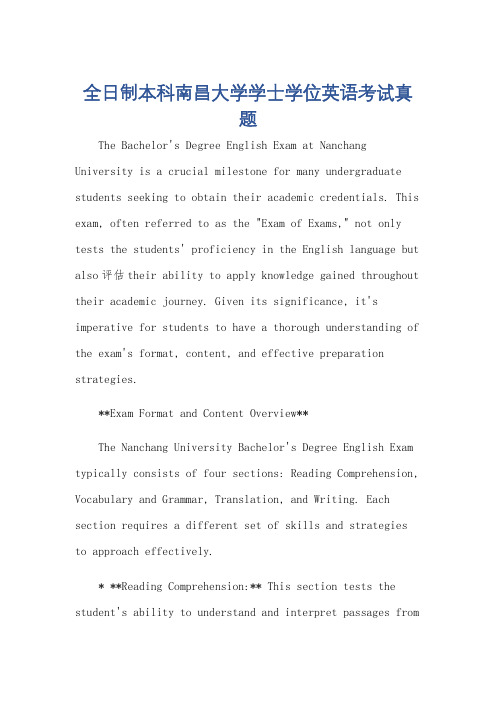
全日制本科南昌大学学士学位英语考试真题The Bachelor's Degree English Exam at Nanchang University is a crucial milestone for many undergraduate students seeking to obtain their academic credentials. This exam, often referred to as the "Exam of Exams," not only tests the students' proficiency in the English language but also评估their ability to apply knowledge gained throughout their academic journey. Given its significance, it's imperative for students to have a thorough understanding of the exam's format, content, and effective preparation strategies.**Exam Format and Content Overview**The Nanchang University Bachelor's Degree English Exam typically consists of four sections: Reading Comprehension, Vocabulary and Grammar, Translation, and Writing. Each section requires a different set of skills and strategies to approach effectively.* **Reading Comprehension:** This section tests the student's ability to understand and interpret passages froma variety of sources, such as newspapers, academic journals, and novels. It is crucial to skim and scan the passages quickly to identify key information and answer questions accurately. * **Vocabulary and Grammar:** This section assesses the student's mastery of the English language's vocabulary and grammar rules. It's essential to have asolid foundation in these areas and to practice using context clues to determine the meaning of unfamiliar words. * **Translation:** This section requires the student to translate passages from English to Chinese and vice versa. Accurate translation requires a deep understanding of both languages and the ability to convey the original text's meaning, tone, and style. * **Writing:** The writingsection tests the student's ability to compose a coherent and well-structured essay on a given topic. It's importantto plan the essay outline before writing, use transitional words to connect ideas, and proofread for grammar and spelling errors.**Effective Preparation Strategies**Preparing for the Nanchang University Bachelor's Degree English Exam requires a comprehensive approach thatcombines both general English proficiency and exam-specific skills. Here are some key strategies to consider:* **Increase Exposure to English:** Improving English proficiency requires regular exposure to the language. Students can achieve this by reading English newspapers, listening to English podcasts, watching English movies, and practicing speaking with native speakers. * **Understand the Exam Format and Content:** It's essential tofamiliarize oneself with the exam's format and content to identify areas of weakness and focus on targeted preparation. Students can refer to previous exam papers to understand the types of questions and the difficulty level. * **Practice with Mock Exams:** Taking mock exams helps students familiarize themselves with the exam's format and timing. It also allows them to identify areas where they need to improve and areas where they are strong. * **Focus on Weaknesses:** After analyzing mock exam results, students should focus on improving their weaknesses. This could involve additional practice in areas such as vocabulary, grammar, or reading comprehension. * **Maintain a Positive Mindset:** Preparing for exams can be stressful, but it's important to maintain a positive mindset. Studentsshould believe in their abilities, stay motivated, and avoid getting overwhelmed by the pressure.In conclusion, the Nanchang University Bachelor's Degree English Exam is a challenging but rewarding experience. By understanding the exam's format and content, implementing effective preparation strategies, and maintaining a positive mindset, students can confidently face this exam and achieve their academic goals.**全日制本科南昌大学学士学位英语考试真题解析与备考策略**南昌大学全日制本科学士学位英语考试对于许多寻求获得学术证书的本科生来说是一个重要的里程碑。
20-21(上) 20级本科大学英语I期考考核方案

《大学英语》课程本科考核实施方案
(供各专业2020级本科学生用)
一、课程基本情况
1.课程名称:大学英语I
2.课程性质:必修
3.课程学时安排与内容比例:46学时/每学期;理论课:46;实践课:0
二、考核对象:2020级各专业本科
三、考核目标:测试学生听、说、读、写、译的语言技能
四、考核内容、要求、形式、评价标准、成绩比例与时间
1. 成绩评定:平时成绩50%(随行课堂20%+词达人10%+学习通10%+课堂表现10%)+第二课堂加分+期末考试成绩50%=期评成绩(即:学期末总成绩)。
期评成绩达60分以上者均可获得本门课程本学期本课程的学分。
2. 考试范围:
《全新版大学进阶英语综合教程第1册》1-6单元;
随行课堂综合教程1-6单元CET-Oriented
随行课堂视听说教程1-8单元self-test
3. 考试题型:
Part Ⅰ Writing (共15分,课外)
Part Ⅱ Listening Comprehension(共30分,课内)
Part Ⅲ V ocabulary (共10分,课内)
Part Ⅳ Reading Comprehension (共30分,课外)
Part Ⅴ Translation-- Chinese to English(共15分,课内)
4. 考试方法:闭卷笔试
5. 考试要求:学生自带收音机接收听力,播放频道FM 84.0,自带2B铅笔填涂标准答题卡。
6. 考试时间:120分钟
各大题结构、分值与范围。
管理类联考英语考什么?题型在这里!
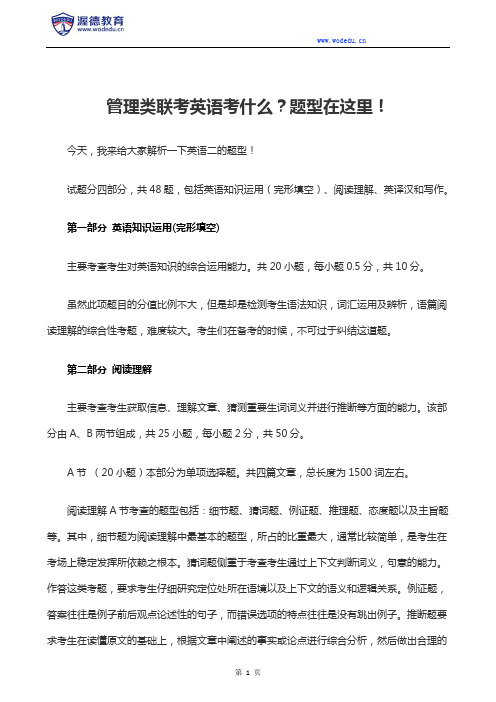
管理类联考英语考什么?题型在这里!今天,我来给大家解析一下英语二的题型!试题分四部分,共48题,包括英语知识运用(完形填空)、阅读理解、英译汉和写作。
第一部分英语知识运用(完形填空)主要考查考生对英语知识的综合运用能力。
共20小题,每小题0.5分,共10分。
虽然此项题目的分值比例不大,但是却是检测考生语法知识,词汇运用及辨析,语篇阅读理解的综合性考题,难度较大。
考生们在备考的时候,不可过于纠结这道题。
第二部分阅读理解主要考查考生获取信息、理解文章、猜测重要生词词义并进行推断等方面的能力。
该部分由A、B两节组成,共25小题,每小题2分,共50分。
A节(20小题)本部分为单项选择题。
共四篇文章,总长度为1500词左右。
阅读理解A节考查的题型包括:细节题、猜词题、例证题、推理题、态度题以及主旨题等。
其中,细节题为阅读理解中最基本的题型,所占的比重最大,通常比较简单,是考生在考场上稳定发挥所依赖之根本。
猜词题侧重于考查考生通过上下文判断词义,句意的能力。
作答这类考题,要求考生仔细研究定位处所在语境以及上下文的语义和逻辑关系。
例证题,答案往往是例子前后观点论述性的句子,而错误选项的特点往往是没有跳出例子。
推断题要求考生在读懂原文的基础上,根据文章中阐述的事实或论点进行综合分析,然后做出合理的推断和预测。
考生在备考此类题型的时候切不可照本宣科,也不可望文生义,更加不可颠倒事实。
推断是基于原文推出来的,大家做题的时候务必引起重视。
态度题是比较容易拿分的一种类型的考题,因为根据老师课上的讲解,有些选项可以不看文章就基本上直接排除题,再去结合原文,找到相关包含感情色彩的形容词或者副词,基本上就能判断作者的态度是什么。
主旨题是很多考生既觉得熟悉又很困惑的题型,主旨题一般位于最后一题,也就是结尾处,通常考生必须要读完全文才能准确把握文章主旨,此类考题概括性强,阅读量大,所以考生做这类题的时候,不要急于求成。
B节(5小题)本节有两种备选题型。
大学英语 考核方式

《基础外语2-1》考核办法及评分标准本课程总成绩由两部分组成:1.形成性评估(30%)包括:平时成绩15%(出勤;作业:翻译、作文、课外练习;课堂表现:小组讨论、课堂演讲、角色扮演、戏剧表演、读书汇报、辩论、影视配音、模拟导游等)+ 自主学习15%(网络支撑或非网络支撑:基于《新理念大学英语教学平台》的综合教程学习及测试、基于《新理念大学英语教学平台》听说教程学习及测试、课外补充学习材料学习及测试)。
2.终结性评估(70%)包括:期末笔试60% (试题类型:汉译英翻译、听力、阅读、词汇与语法结构、完形填空)+口语测试10%(试题类型:段落朗读、回答问题)。
口语考试评分标准Part I Read AloudPart II Answering Questions & Part III Describing Pictures笔试试卷答案Part I TranslationT1 Suddenly I wanted to write about that, about the warmth and good feeling of it, but I wanted to put it down simply for my own joy, not for Mr. Fleagle.T2 The world today is filled with dangers, hence the sick joke that the reason we have not been contacted by an alien civilization is that civilizations tend to destroy themselves when they reach our stage.T3 They found the farm green with vegetables, the little house livable and homey. There was a tractor and a good car in the yard.T4 Suppose I’m beautiful. I’d always be haunted by the feeling that you had been taking a chance on just that, and that kind of love would disgust me.T5 Chantek figured out that if he did tasks like cleaning his room, he’d earn coins to spend on treats and rides in Miles’s car.《基础外语2-2》考核办法及评分标准本课程总成绩由两部分组成:1.形成性评估(30%)包括:平时成绩15%(出勤;作业:翻译、作文、课外练习;课堂表现:小组讨论、课堂演讲、角色扮演、戏剧表演、读书汇报、辩论、影视配音、模拟导游等)+ 自主学习15%(网络支撑或非网络支撑:基于《新理念大学英语教学平台》的综合教程学习及测试、基于《新理念大学英语教学平台》听说教程学习及测试、课外补充学习材料学习及测试)。
大学英语期末试题分析总结
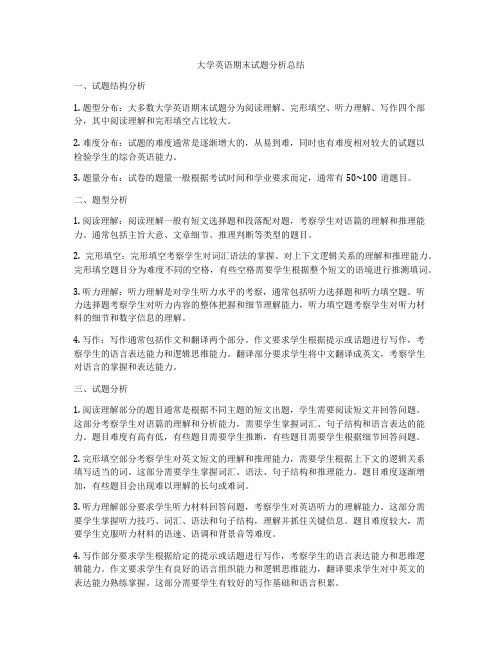
大学英语期末试题分析总结一、试题结构分析1. 题型分布:大多数大学英语期末试题分为阅读理解、完形填空、听力理解、写作四个部分,其中阅读理解和完形填空占比较大。
2. 难度分布:试题的难度通常是逐渐增大的,从易到难,同时也有难度相对较大的试题以检验学生的综合英语能力。
3. 题量分布:试卷的题量一般根据考试时间和学业要求而定,通常有50~100道题目。
二、题型分析1. 阅读理解:阅读理解一般有短文选择题和段落配对题,考察学生对语篇的理解和推理能力。
通常包括主旨大意、文章细节、推理判断等类型的题目。
2. 完形填空:完形填空考察学生对词汇语法的掌握、对上下文逻辑关系的理解和推理能力。
完形填空题目分为难度不同的空格,有些空格需要学生根据整个短文的语境进行推测填词。
3. 听力理解:听力理解是对学生听力水平的考察,通常包括听力选择题和听力填空题。
听力选择题考察学生对听力内容的整体把握和细节理解能力,听力填空题考察学生对听力材料的细节和数字信息的理解。
4. 写作:写作通常包括作文和翻译两个部分。
作文要求学生根据提示或话题进行写作,考察学生的语言表达能力和逻辑思维能力。
翻译部分要求学生将中文翻译成英文,考察学生对语言的掌握和表达能力。
三、试题分析1. 阅读理解部分的题目通常是根据不同主题的短文出题,学生需要阅读短文并回答问题。
这部分考察学生对语篇的理解和分析能力,需要学生掌握词汇、句子结构和语言表达的能力。
题目难度有高有低,有些题目需要学生推断,有些题目需要学生根据细节回答问题。
2. 完形填空部分考察学生对英文短文的理解和推理能力,需要学生根据上下文的逻辑关系填写适当的词。
这部分需要学生掌握词汇、语法、句子结构和推理能力。
题目难度逐渐增加,有些题目会出现难以理解的长句或难词。
3. 听力理解部分要求学生听力材料回答问题,考察学生对英语听力的理解能力。
这部分需要学生掌握听力技巧、词汇、语法和句子结构,理解并抓住关键信息。
南昌大学英语考试A版题目及课内部分答案
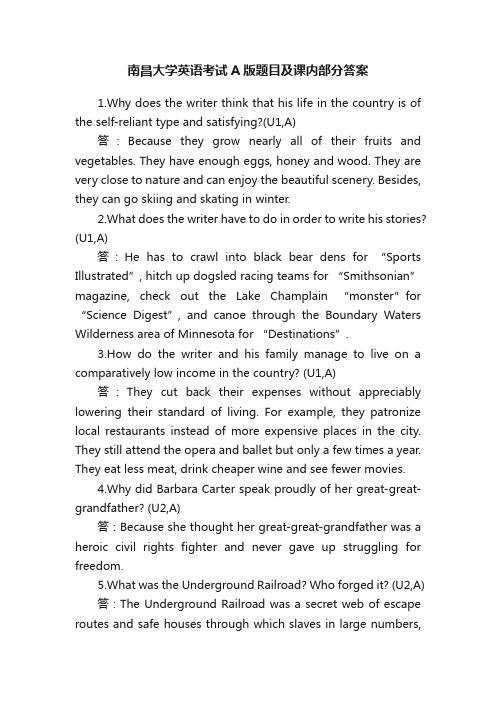
南昌大学英语考试A版题目及课内部分答案1.Why does the writer think that his life in the country is of the self-reliant type and satisfying?(U1,A)答:Because they grow nearly all of their fruits and vegetables. They have enough eggs, honey and wood. They are very close to nature and can enjoy the beautiful scenery. Besides, they can go skiing and skating in winter.2.What does the writer have to do in order to write his stories? (U1,A)答:He has to cra wl into black bear dens for “Sports Illustrated”, hitch up dogsled racing teams for “Smithsonian” magazine, check out the Lake Champlain “monster”for “Science Digest”, and canoe through the Boundary Waters Wilderness area of Minnesota for “Destinations”.3.How do the writer and his family manage to live on a comparatively low income in the country? (U1,A)答:They cut back their expenses without appreciably lowering their standard of living. For example, they patronize local restaurants instead of more expensive places in the city. They still attend the opera and ballet but only a few times a year. They eat less meat, drink cheaper wine and see fewer movies.4.Why did Barbara Carter speak proudly of her great-great-grandfather? (U2,A)答:Because she thought her great-great-grandfather was a heroic civil rights fighter and never gave up struggling for freedom.5.What was the Underground Railroad? Who forged it? (U2,A)答:The Underground Railroad was a secret web of escape routes and safe houses through which slaves in large numbers,with the help of lots of courageous people, fled to the North and obtained freedom. A long list of courageous men and women together forged the Underground Railroad.6.What difficulties did the slaves have in traveling the Underground Railroad to freedom? (U2,A)答:They had to travel hundreds of miles through unknown country with no road sign and few maps, usually under cover of night.7.Why did many slaves go to Canada? (U2,A)答:Because slavery had been abolished there in 1833, and Canadian authorities encouraged the runaways to settle their virgin land.8.What help did the Hensons receive on the way to safety and freedom? (U2,A)答:In Cincinnati the members of the Underground Railroad provided for their welfare, and set them thirty miles on their way by wagon. In Buffalo, N.Y. a friendly captain gave Henson a dollar and arranged for a boat, which carried them to Canada.9.What has taken the place of the ear when people could safely keep their front doorunlocked? (U3,A)答:It has been replaced by an era when people employ various security devices at home.10.Under what excuse do people resort to all these means? Does the author think they are justified in doing so? (U3,A) 答:All is done in the name of “security”. But according to the aut hor, America, with all this “security”, is perhaps the most insecure nation in the history of civilization.11.What may be the legacy we remember best when we recall this era? (U3,A)答:We may have locked the evils out, but in so doing we have locked ourselves in.12.What did Einstein publish in 1905? Why is it said they are “the most important papers in the history of science”? (U4,A)答:He published five of the most important papers in the history of science. This is because they proved that atoms and molecules existed, laid the foundation for quantum mechanics, describe the theory of special relativity, and advanced the famous equation: E=mc213.What was remarkable about 1905? For what did Einstein win the Nobel Prize in 1920? (U4,A)答:What was remarkable about 1905 is that year a single person authored five of the most important papers in science. Einstein proposed in 1905 that light is particulate and for this he won the Nobel Prize in 192114.What did Peter Galison mean by saying “Einstein was no space al ien”? (U4,A) 答:He meant that like other scientists Einstein was a man of his time. If he hadn’t been born, his 1905 papers would eventually have been written in some form by others.15.How come in Einstein’s day nobody wanted to say light was made of particles? (U4,A)答:Because if you did so you would find yourself disagreeing with physicist James Clerk Maxwell, an Authority Figure who had proved that light was an electromagnetic wave.16.What did Einstein credit this discoveries to ? (U4,A)答:He credited his discoveries to imagination and endless questioning more so that otthodox intelligence.17.When and where did the writer write the three” thank-you” letters? (U5A)答:He wrote them on a ship on the way to the island of Tulagi in the South Pacific on Thanksgiving Day, 1943.18.What did the writer say in his letter to his grandmother? (U5A)答:He recalled how his grandmother had taught him to tell the truth, to share, and to be forgiving and considerate of others. And he thanked her for her delicious food and for all the wonderful things she had done for him.19.How did the writer feel when he read the replies from his father, the Rev. Nelson and his grandmother? Why?(U5 A) 答:His reading of their letters left him not only astonished but also more humbled than before, because they all thanked him rather than saying they would forgive him for not having previously thanked them.20.What did the writer wish for all people when another Thanksgiving was drawing near? (U5A)答:The writer wished for all people the common sense to achieve world peace, and find the good and praise it.21.Who are the two special people in your life? Why?22.Which famous person do you know best? Please give a short introduction of him or her.23.How are you feeling now? Why?24.How do you think of the food here on campus?25.What is your favourite food? Why?26.What is typical of a traditional family?27.Are you interested in music or fashion? Why or why not?28.Would you please tell a story of a notorious robbery or other crime you have even known?29.Do you know some unsolved mystery? Please give a brief introduction.30.What precautions can we do to prevent potential insecurity?。
大学英语期末考试题型及复习范围(优秀范文5篇)
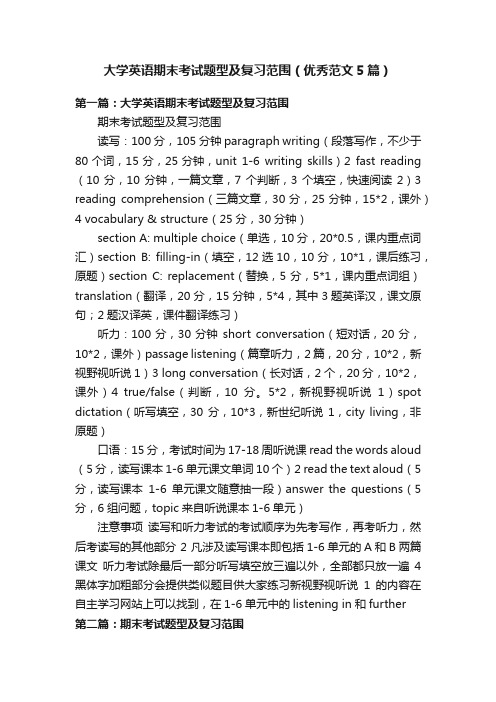
大学英语期末考试题型及复习范围(优秀范文5篇)第一篇:大学英语期末考试题型及复习范围期末考试题型及复习范围读写:100分,105分钟 paragraph writing(段落写作,不少于80个词,15分,25分钟,unit 1-6 writing skills)2 fast reading (10分,10分钟,一篇文章,7个判断,3个填空,快速阅读2)3 reading comprehension(三篇文章,30分,25分钟,15*2,课外)4 vocabulary & structure(25分,30分钟)section A: multiple choice(单选,10分,20*0.5,课内重点词汇)section B: filling-in(填空,12选10,10分,10*1,课后练习,原题)section C: replacement(替换,5分,5*1,课内重点词组)translation(翻译,20分,15分钟,5*4,其中3题英译汉,课文原句;2题汉译英,课件翻译练习)听力:100分,30分钟short conversation(短对话,20分,10*2,课外)passage listening(篇章听力,2篇,20分,10*2,新视野视听说1)3 long conversation(长对话,2个,20分,10*2,课外)4 true/false(判断,10分。
5*2,新视野视听说1)spot dictation(听写填空,30分,10*3,新世纪听说1,city living,非原题)口语:15分,考试时间为17-18周听说课 read the words aloud (5分,读写课本1-6单元课文单词10个)2 read the text aloud(5分,读写课本1-6单元课文随意抽一段)answer the questions(5分,6组问题,topic来自听说课本1-6单元)注意事项读写和听力考试的考试顺序为先考写作,再考听力,然后考读写的其他部分 2 凡涉及读写课本即包括1-6单元的A和B两篇课文听力考试除最后一部分听写填空放三遍以外,全部都只放一遍4 黑体字加粗部分会提供类似题目供大家练习新视野视听说1的内容在自主学习网站上可以找到,在1-6单元中的listening in和further第二篇:期末考试题型及复习范围期末考试题型及复习范围题型:Part onevocabulary and Structure50题,每题1分Part twoReading Comprehension2篇文章,10题,每题1分Part threeCloze1篇文章,10题,每题1分Part fourTranslation1篇英译汉,10分5个汉译英句子,每个句子4分复习范围:第一部分词汇与结构P127,P270 词汇与结构题第二部分阅读理解P121-124P266-269第三部分完型填空P58P273(只有10个空填词)第四部分翻译英译汉第一、三单元,每单元前三段。
期末题型

期末考试题型题量和分值分布情况说明考试时间:12月27日(周四)下午1:30—3:00考试地点:博学楼301考题共13页,分为四大部分,共有10类题目。
第一大部分为词汇考查部分,重点考查词干、词缀知识和词型变换,共25分第一题的要求如下:Directions: Using the answer line provided, complete each italicized word in the sentences below with the correct word part from the box. (5 points)在方框内会给出10个词干和词缀,然后会有10个句子,其中某个词会扣掉其中的一个词干或词缀,要求根据句子提供的上下文选出合适的词干和词缀使这个词和这句话都完整起来。
每个词干或词缀0.5分,共5分。
写答案时只写填的词干或词缀部分即可,不用把整个单词抄全。
(我们在TAS平台上放过这样的一篇练习)第二题的要求如下:Directions: Match the following underlined words in each sentence with their definitions Make use of the contexts provided and the word formation knowledge you have. (8 points)这是词意搭配题。
这一部分会给出8个句子,每句中挑出一个词,并给出8个定义,要求根据所提供的上下文和定义里面出现的某一关键词干和词缀快速选出每个词的定义。
每词1分,共8分。
第三题的要求如下:Directions: Fill in the blank with a word that both defines the boldfaced word part and makes sense in the sentence. (4 points)该部分仍然考查我们对词干和词缀的理解。
南昌大学管理学期末考试2004~2011真题

南昌大学管理学期末考试2004~2011真题南昌大学管理学期末考试2004~2011真题2004年一、简答题(每小题15分,共90分)1、议会共和制与总统共和制的异同2、政党的特征3、现代管理经济方法的科学化4、现代管理的领导素质5、社会及其特征6、地域环境与社区发展二、论述题(每小题20分,共60分)1、我国人民代表大会制的基本特点2、现代管理的激励艺术3、社会控制的一般特征及其类型2005年一、简述题(每小题15分,共90分)1、霍桑试验2、风险型决策3、头脑风暴法4、需要层次论5、双因素理论6、菲德勒权变论二、论述题(每小题20分,共60分)1、试论领导与管理2、试论组织变革的动因3、试述现代管理的决策过程2006年一、名词解释(每小题6分,共36分)1、管理2、科学管理之父3、决策4、职业计划5、激励6、绩效管理二、简答题(每小题12分,共60分)1、简述权变管理理论2、简述目标管理基本思想3、简述组织设计的原则4、简述公平理论的主要内容5、简述新公共管理的内涵三、论述题(每小题18分,共54分)1、试论领导者的类型2、试论现代管理的控制过程3、试从管理的角度分析治理与统治的异同2007年一、简述题(每小题12分,共96分)1、简述泰罗的科学管理理论2、简述行为决策理论的主要内容3、简述目标管理的过程4、简述组织文化的主要特征5、简述头脑风暴法6、简述领导与管理的异同7、简述控制过程的基本环节8、简述公共选择理论对政府管理的影响二、论述题(每小题18分,共54分)1、现代管理的战略环境分析2、比较分析外部招聘和内部提升的优劣3、试评政府管理改革中的企业顾客导向原则的引入和运用2008年一、简述题(每小题15分,共90分)1、简述权变管理理论2、简述控制过程的基本环节3、简述领导与管理的异同4、简述公平理论的主要内同5、简述现代管理的决策过程6、简述治理与统治的关系二、论述题(每小题20分,共60分)1、试比较分析计划与决策2、试论组织变革的动因3、试评马克斯.韦伯的官僚制理论2009年一、简述题(每小题15分,共90分)1、简述马克斯.韦伯官僚制的主要特征2、简要评述公平理论3、简述领导与管理的异同4、简述现代管理的决策过程5、简述员工外部招聘的优劣6、简述控制的必要性二、分析、论述题(每小题20分,共60分)1、试分析现代管理的战略环境2、试论组织文化的核心内容与塑造途径3、试分析组织内冲突的原因和冲突的管理方式2010年一、简述题(每小题15分,共90分)1、简述双因素理论2、简要评述权变管理理论3、简述领导与管理的异同4、简述员工内部提升的优劣5、简述组织变革的动因6、简述治理与统治的关系二、分析、论述题(每小题20分,共60分)1、试比较分析科学管理理论与行为科学理论的特点2、试论组织文化的功能与塑造途径3、试分析影响有效沟通的障碍因素及沟通障碍的消除方式2011年一、简述题(每小题10分,共60分)1、简述泰罗的科学管理理论2、简述目标管理基本思想3、简述组织设计的原则4、简述组织文化的主要特征5、简述菲德勒权变论6、简述强化理论二、论述题(每小题25分,共50分)1、比较分析外部招聘和内部提升的优劣2、比较分析需要层次论和双因素理论三、案例分析题(每小题20分,共40分)1、决策知识点2、领导知识点。
南昌大学学位英语考试考试题型

南昌大学学位英语考试考试题型
题型一:完成对话
本部分共有3段不完整的对话,设10道题。
第一段对话设4个空格,下面有用来完成对话的4个选择项,要求考生根据对话内容将全部4个选择项分别填入对话中的空格,使之完整。
第二段和第三段对话分别设3个空格,下面有用来完成对话的4个选择项,要求考生选择其中的3个分别填人对话中的空格,使之完整。
本部分满分为10分,每题1分。
题型二:阅读理解
本部分共有4篇短文,总长度为1200词左右。
每篇文章后设5道题,共20题。
考生需在理解文章的基础上从为每个问题提供的4个选择项中选出一个最佳答案。
本部分满分为40分,每题2分。
题型三:词汇和语法
本部分共设20题,其中10题为词汇题,10题为语法题。
每一题中有一个空白,要求考生在理解句意的基础上在4个选择项中选择一个最佳答案。
本部分满分为20分,每题1分。
题型四:英译汉
本部分可以是一篇长度为120个左右英文单词的短文,要求考生翻译全文;也可以是一个较长的段落,要求考生翻译其中带有下划线的5个句子。
要求译文意思准确,文字通顺。
本部分满分为15分。
题型五:短文写作
本部分可要求考生写一篇常见的应用文,也可用提纲、情景或图表做提示,要求考生说明或论述一个一般性话题,文章长度不低于100个英文单词。
本部分满分为15分。
管理类联考试卷结构分析及备考攻略
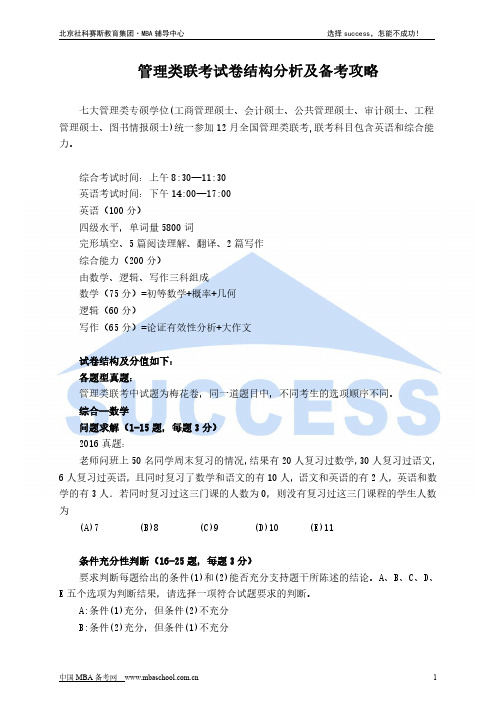
管理类联考试卷结构分析及备考攻略七大管理类专硕学位(工商管理硕士、会计硕士、公共管理硕士、审计硕士、工程管理硕士、图书情报硕士)统一参加12月全国管理类联考,联考科目包含英语和综合能力。
综合考试时间:上午8:30—11:30英语考试时间:下午14:00—17:00英语(100分)四级水平,单词量5800词完形填空、5篇阅读理解、翻译、2篇写作综合能力(200分)由数学、逻辑、写作三科组成数学(75分)=初等数学+概率+几何逻辑(60分)写作(65分)=论证有效性分析+大作文试卷结构及分值如下:各题型真题:管理类联考中试题为梅花卷,同一道题目中,不同考生的选项顺序不同。
综合—数学问题求解(1-15题,每题3分)2016真题:老师问班上50名同学周末复习的情况,结果有20人复习过数学,30人复习过语文,6人复习过英语,且同时复习了数学和语文的有10人,语文和英语的有2人,英语和数学的有3人.若同时复习过这三门课的人数为0,则没有复习过这三门课程的学生人数为(A)7(B)8(C)9(D)10(E)11条件充分性判断(16-25题,每题3分)要求判断每题给出的条件(1)和(2)能否充分支持题干所陈述的结论。
A、B、C、D、E五个选项为判断结果,请选择一项符合试题要求的判断。
A:条件(1)充分,但条件(2)不充分B:条件(2)充分,但条件(1)不充分C:条件(1)和(2)单独都不充分,但条件(1)和条件(2)联合起来充分D:条件(1)充分,条件(2)也充分。
E:条件(1)和条件(2)单独都不充分,条件(1)和条件(2)联合起来也不充分。
某人从A地出发,先乘时速为220千米的动车,后转乘时速为100千米的汽车到达B地.则A,B两地的距离为960千米.(1)乘动车时间与乘汽车的时间相等.(2)乘动车时间与乘汽车的时间之和为6小时.综合—逻辑逻辑(26-55题,单选,每题2分)2016真题—批判性思维:王研究员:我国政府提出的“大众创业、万众创新”激励着每一个创业者。
大学英语期末题型分值总结

2013—2014学年上学期2012级K班《英语读写(4)》《英语听力(4)》期末考题型、指令及分数2012级K班《英语读写(4)》(满分100)考试时间:90分钟1.词汇与结构TVS-S410题(10%)Directions: Choose the best answer to complete the following sentences.2.构词法运用TWB-S4 10题(10%)Directions: Complete the following sentences with the appropriate forms of the words given in brackets.3. 长篇阅读(TLPR-S4)1篇(20%)10小题Directions:In this section, you are going to read a passage with ten statements attached to it. Each statement contains information given in one of the paragraphs. Identify the paragraph from which the information is derived. Y ou may choose a paragraph more than once. Each paragraph is marked with a letter. Answer the questions by marking the corresponding letter. (出题形式参考四级新题型样题)4. 深度阅读TRD -S4 1篇(10%)共10小题Directions: In this section, there is a passage with ten blanks. Y ou are required to select one word for each blank from a list of choices given in a word bank following the passage. Read the passage through carefully before making your choices. Each choice in the bank is identified by a letter. Please choose the corresponding letter. Y ou may not use any of the words in the bank more than once.5. 传统阅读TPR-S4 1篇(20%)共5小题Directions: The passage in this section is followed by some questions or unfinished statements. For each of them there are four choices marked A), B), C) and D). Y ou should decide on the best choice and choose the corresponding letter.6. 汉译英TCE-S4 1题(15%)1段Directions: For this part, you are allowed 30 minutes to translate a passage from Chinese into English. (出题形式参考四级新题型样题)7. 写作TGW-S4 1题(15%)1篇Directions: For this part, you are allowed 30 minutes to write an essay. You should write at least 120 words but no more than 180 words.2012级K班《英语听力(4)》(满分100)考试时间:30分钟1.短对话(TLSC-S4)40%,10小题,每题4分Directions: Listen to the following ten short conversations and choose the best answer to each of the questions.2.长对话(TLLC-S4)20%,1个长对话,5个问题;每题4分。
2022年南昌大学行政管理专业《管理学》科目期末试卷A(有答案)

2022年南昌大学行政管理专业《管理学》科目期末试卷A(有答案)一、选择题1、竞争优势是使组织别具一格和有与众不同的特色,这种与众不同的特色来自组织的()。
A.战略 B.结构 C.文化 D.核心能力2、决定是否与另一个组织合并,如何重组以提高效率,或是否关闭一个亏损的工厂,这些都是典型的()。
A.确定型决策 B.非程序化决策C.例常型决策 D.重复性决策3、在20世纪30年代,确信管理者的工作是激励雇员做出更多努力,并首先提出组织是一个开放系统观点的学者是()。
A.亨利·法约尔 B.马克斯·韦伯C.切斯特·巴纳德 D.埃尔顿·梅奥4、()是第一个将管理定义为一组普遍适用的职能的人,他认为管理是人类所从事的一种共同活动。
A.明茨伯格B.法约尔C.德鲁克D.韦伯5、企业选择产业中的一个或者一组细分市场,制定专门的战略向此市场提供产品或者服务,这是典型的()。
A.增长型战略 B.别具一格战略 C.专一化战略 D.公司层战略6、在组织设计中,用来描述组织中各项工作标准化以及员工行为受规则和程序约束程度的变量或要素是()。
A.工作专门化 B.正规化C.管理跨度D.部门化7、在管理方格(managerial grid)理论中,任务型管理是指如下哪种情形?()A.对人和工作两个维度都非常关注B.更关注人C.对人和工作两个维度都不是特别关注D.更关注工作8、以下哪一种组织结构违背了“统一指挥”的组织原则?()A.直线职能制 B.直线职能辅以参谋职能制C.事业部制 D.矩阵制9、如果管理者非常重视组织成员的高满意度,则()沟通网络是最有效的。
A.轮式 B.全通道式 C.小道消息D.链式10、()不属于创业精神所主要强调的三个方面的主题。
A.对机会的追求B.创新C.增长D.拼搏二、名词解释11、组织发展12、程序化决策13、差别化战略14、管理万能论15、人际关系角色16、工作专门化与部门化17、无边界组织18、路径—目标理论三、简答题19、1.解释为何学习管理史如此重要。
